Let me help clear up any misinformation on a sometimes confusing topic – fiber and IBS (Irritable Bowel Syndrome). In recent years fiber-rich foods, either naturally occurring or fiber fortified, have carried a bit of a health halo encouraging us to eat more to better our gut bacteria and improve our health.
While increased fiber is encouraged for the majority, not all fiber sources are well tolerated for those suffering with IBS. We cover the topic Fiber and Irritable Bowel Syndrome (IBS): What You Need To Know in this article.
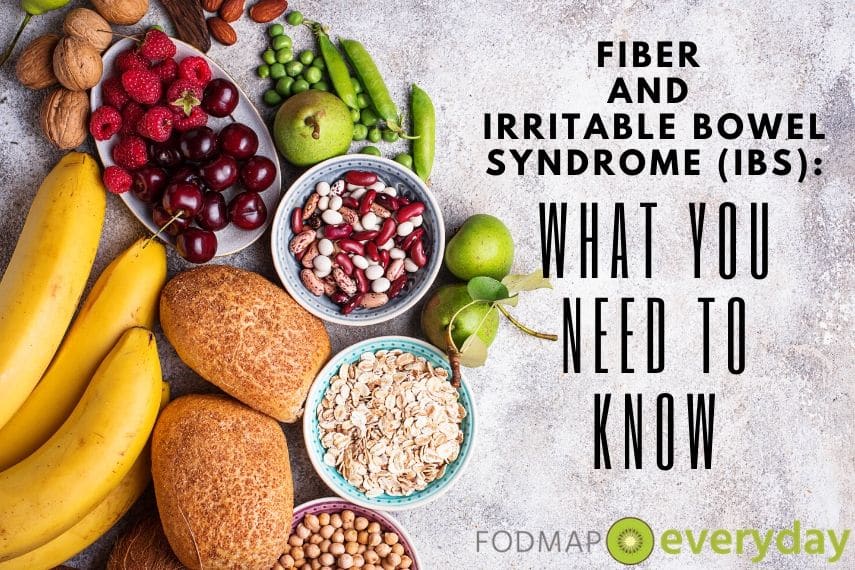
Does Increased Fiber Intake Help IBS?
For those with IBS-D (irritable bowel syndrome with diarrhea), you may be wondering if consuming more fiber will worsen your symptoms by increasing the frequency or urgency of your bowel movements.
Those with IBS-C may have experimented with a high fiber diet and/or a fiber supplement and actually felt worse.
It is not uncommon for health care providers to recommend a high fiber diet as nutrition therapy for IBS prior to the popularity of the low FODMAP diet. Oftentimes this broad stroke recommendation led to excessive FODMAP intake, worsening symptoms, specifically bloating, gas and abdominal pain.
Let me preface, fiber comes in many different forms and its properties greatly affect the function it has within the gut.
All fibers resist digestion, however only some are fermentable and those are more likely to provoke IBS symptoms. There are many gut-friendly fiber-rich foods to choose from that can actually help improve your IBS symptoms if you choose wisely.
What Exactly is Fiber?
By definition fiber is mostly indigestible material in food that stimulates the intestine to peristalsis and promotes elimination of waste from the large intestine. Understanding the difference between soluble and insoluble fibers is important.
Soluble Fibers
Soluble fibers dissolve in water, pull water into the stool, and form a gel like substance that helps move contents down the GI (gastrointestinal) track. Soluble fibers are found in many foods such as oats, strawberries, citrus fruit, rice, potatoes, beans, broccoli, and carrots.
Watch out for the prebiotic soluble fibers inulin and fructooligosacchharides (FOS), which are highly fermentable and best avoided since they may trigger IBS symptoms. These sneaky little ingredients are often added to protein shakes and bars, yogurts, probiotic supplements, fiber supplements and more.
You May Want To Read: IBS & Probiotics: Should I Take Them? and All About Low FODMAP Meal Replacements and Protein Shakes
Inulin is naturally occurring in asparagus, chicory root, garlic, onions, and artichoke, which are all high FODMAP foods. Note that some of these foods do have low FODMAP serving sizes.
Read more in our article, High FODMAP Foods With Low FODMAP Serving Sizes.
Insoluble Fibers
Large, coarse insoluble fibers help regulate bowels in healthy individuals by irritating the lining of the large intestine inducing a bowel movement. These fibers are often referred to as roughage and add bulk to stool. Insoluble fibers pass through the GI tract without change.
Not to be too visual, but think of the last time you ate corn and leafy greens? This fiber source can speed up gut transit time, which may be helpful for those with IBS-C, and no so helpful for those with IBS-D.
Insoluble fiber sources include wheat bran, nuts, seed hulls, kale, blackberries, cauliflower and fruit skins to name a few.
You May Want To Read: Top 5 High Fiber Low FODMAP Foods
Why Fiber is Important!
Fiber is an essential nutrient for overall health as it provides benefits for a multitude of health conditions including IBS (when chosen correctly), cardiovascular disease, cancer, diabetes, weight management, and more.
Several fiber sources are considered prebiotics which stimulate the growth of the beneficial gut bacteria leading to a more diverse and healthier gut microbiome.
Fiber intake is often compromised when adopting a low FODMAP diet, which can have adverse effects on the beneficial gut bacteria and IBS symptoms. To exemplify, constipation may worsen if fiber intake plummets and this may negatively affect the results of your low FODMAP diet experiment.
[bctt tweet=”It is important to emphasize variety and frequent intake of low FODMAP fiber rich foods when embarking on a low FODMAP diet.” username=”FODMAPeveryday”]
It is important to emphasize variety and frequent intake of low FODMAP fiber rich foods when embarking on a low FODMAP diet. As a dietitian I like to take a “food first” approach, however fiber supplements may be helpful, especially if one is struggling to meet their fiber needs.
The DRI or “daily recommended intake” of fiber for adults is 25-38 grams per day (women should aim for 25, and men 38). The average adult consumes only 15 grams per day, a significant deficit. One must make an effort to consume fiber-rich foods at every meal and most snacks in order to hit this target goal.
Let’s break down why fiber is important for IBS-C, D, and M (IBS- mixed where one experiences both constipation and diarrhea).
IBS-C & Fiber
Fiber is crucial for regular bowels. Prior to initiating the low FODMAP diet, I often recommend my patients strive to hit their fiber goal via whole foods and possibly supplements to see if this therapy provides relief. It takes a conscious effort to meet the fiber goal of 25-38 grams per day without a strategic effort.
If you feel that you all already hitting or exceeding your fiber goal and you are still experiencing gas and bloating, you may also be experiencing back up bloating due to inadequate elimination.
Back up bloating can occur in those with slow gut transit time and constipation, due to a build up of stool and gas. It is important to ensure you have an effective bowel regimen in place to allow for adequate laxation when fiber intake is high, this may require modifications such as postural changes when toileting (check out the squatty potty), the addition of osmotic laxatives, and/or magnesium salts.
I want to link you to this article from FODMAP Everyday® Success Team Contributor Tamara Duker Freuman MS, RD, CDN who does a wonderful job explaining this scenario.
IBS-D & Fiber
Many of my IBS- D patients think fiber is bad since it is associated with more frequent bowels. It is important to remember that fiber (specifically soluble) can act as a bulking agent AND can help bind stools, working magic for those suffering from diarrhea.
Yes, fiber can add bulk to bowels, however it can also hold stool together and form a viscous gel helping to minimize diarrhea episodes. It often takes a little experimenting to find the right combination or foods and fiber supplements. It is best to increase soluble fibers such as oats, beans, flaxseeds, chia seeds, and low FODMAP fruits and vegetables to boost this beneficial fiber.
Always remember to drink adequate water intake when increasing fiber intake since risk of constipation is more likely to occur if we are dehydrated, plus the extra fiber requires extra water for digestion.
Check out these high fiber, low FODMAP foods. Please use your Monash University app for exact low FODMAP serving sizes.
-
1-ounce (30 g) pumpkin seeds = 5.2 grams fiber
-
1 tablespoon Chia seeds = 4.1 grams fiber
-
1 tablespoon Flax seeds = 2.9 grams fiber
-
1 medium sweet potato baked in skin = 3.8 grams fiber
-
1 medium baked potato in skin = 3.6 grams fiber
-
3 cups (55 g) air popped popcorn = 3.5 grams fiber
-
1 medium orange = 3.1 grams fiber
-
1-ounce (30 g) nuts = ~3 grams fiber
-
½ cup (78 g) cooked quinoa = 2.6 grams fiber
-
½ cup (84 g) canned and drained chickpeas = 8.1 grams fiber
-
½ cup (90 g) cooked black beans = 7.5 grams fiber
-
½ cup (52 g) raw oats = 4 grams fiber
-
1 cup (150 g) strawberries = 2.9 grams fiber
-
1 cup (125 g) chopped carrot = 3.6 grams fiber
Here is an example of a low FODMAP, fiber rich day. This menu provides ~34 grams of fiber.
Breakfast
⅓ cup (34 g) dry oats cooked in water or lactose-free milk, 2 tablespoon walnuts pieces, 1 tablespoon chia seeds, and ¼ cup (40 g) fresh or frozen blueberries .
Lunch
3 cup (112 g) mixed low FODMAP greens (such as arugula, kale and lettuce), ¼ cup (42 g) canned and drained chickpeas, 1-2 tablespoon shredded cheese, 10 chopped almonds, and ⅓ cup (52 g) cooked quinoa, and low FODMAP salad dressing
Snack
Lundberg Brown Rice Cake + 1 small ripe banana + 1 tablespoon peanut butter
Dinner
3-ounces (85 g) protein of choice (chicken, fish, beef, etc.), 12 green beans, 1 cup cooked carrots, and 1 cup (180 g) cooked brown rice.
Snack
Orange
Should I Be Taking a Fiber Supplement?
Remember this is not a one size fits all situation. There are several fiber supplements that are appropriate for IBS. Please speak with your dietitian or health care provider to see if a fiber supplement is appropriate for you.
#1. Psyllium Husk Fiber
This fiber retains water and provides bulky, easy-to-pass soft stools. Psyllium has been shown to be more effective than stool softeners for those with chronic idiopathic constipation and is also touted as one of the “go to” fiber source for IBS. It has been shown to help normalize stools and reduce IBS symptoms .
As a dietitian I recommended pure psyllium husk powder mixed with a little cranberry juice, lactose-free milk, or low FODMAP milk alternative such almond, rice, or lactose-free milk. It thickens up quickly so be ready to drink soon after mixing. Metamucil is a psyllium-based product that comes in several flavors. I am less inclined, however, to recommend this brand due to the large amounts of added sugar.
#2. Partially Hydrogenated Guar Gum
Partially Hydrogenated Guar Gum (PHGG) is also known as Sunfiber. This is a water soluble, non-viscous fiber supplement. It has become a more popular fiber supplement in the FODMAP community and many PHGG fiber supplements are low FODMAP certified including Regular Girl, Nutrisource Fiber in addition to Sunfiber. This fiber supplement dissolves well in most liquids. Sunfiber is a prebiotic fiber that may help populate the gut microbiome, which may be negatively affected when one adapts a low FODMAP diet. Evidence supports PHGG in the management of both IBS-C and IBS-D.
CLICK HERE TO BUY REGULAR GIRL
#3. Acacia Fiber
Acacia fiber, also known as acacia gum, is a soluble fiber that helps promote regularity. This fiber tends to mix well and does not thicken up like some fiber supplements making it a little easier to drink for some.
#4 Methylcellulose
Methylcellulose is found in Citrucel and MiraFiber is a non-fermentable fiber source, which is suitable for those with IBS. Both the powder or capsules are effective, however be sure to read the directions for proper dosing.
#5 Calcium Polycarbofill
Calcium Polycarbofill is found in FiberCon, is low FODMAP, and can be effective for either IBS-C or IBS-D.
#6. Wheat Dextrin
Wheat dextrin, also know as Benefiber, is a soluble fiber and not well studied with IBS patients, however, clinically it appears to be well tolerated. Discuss the possibility of trying this with your dietitian.
Fiber Supplements To Avoid
#1. Inulin
Inulin based fiber supplements should be avoided when following the low FODMAP diet. Take a look at this gummy bear fiber supplement I saw at the pharmacy recently (ingredients below)! This would NOT be a good choice since the first ingredient is inulin, a high FODMAP ingredient.
Ingredients: Inulin (a natural vegetable fiber) Sugar, Pectin, Citric Acid. Sodium Citrate, Natural Flavors (Blue Raspberry, Cherry, Pear), Natural Colors (Black Carrot, Annatto, Genipap Juice Concentrate, Watermelon Juice Concentrate), Vegetable Oil, Carnauba Wax
#2. Wheat Bran
Wheat bran is a high FODMAP ingredient and is not a suitable fiber choice.
#3. Polydextrose
You might come across polydextrose-based fiber supplements. These have not been well studied in relation to IBS and can flare IBS symptoms for some.
Ingredients To Avoid
As always, read the label!
Avoid the following ingredients:
- Xylitol
- Sorbitol
- Malitol
- Lactitol
These are all sugar alcohols which fall under the polyol group, which are high FODMAP. Watch out for supplements that are labeled sugar-free since this can be a sign that they contain sugar alcohols.
- FOS or fructooligosaccharides
- Fructose (glucose-fructose syrup is okay; fructose-glucose syrup is not)
- High Fructose Corn Syrup (regular corn syrup is fine)
- Agave or honey in excessive amounts (Monash has lab tested these sweeteners and 1 teaspoon is low FODMAP but it is very difficult to tell how much is included in a prepared food or supplement).
Testing What Works For You: One Fiber Might Work When Another Doesn’t
Many of us have “trialed” a fiber supplement at one time.
If you were not happy with the results, it is worth trying a different fiber supplement, since they behave differently and you may find one that works better.
For those who had a bad outcome with a particular fiber, avoid this fiber source and try one of these other gut-friendly fiber sources discussed in this article. Always start off small and increase as needed. Be sure to look at the serving size since these vary brand to brand. Powders often contain more fiber than capsules.
While there is not a perfect time to take a fiber supplement, I often encouraged my patients to take them when they are most likely to remember. Personally, I prefer the evening time and have seen better results with this time window. For those who are afraid of bloating, an evening trial may be less nerve wrecking than earlier in the day.
I hope this helps shed light on the importance of fiber and what fibers to reach for. Please consult your Registered Dietitian and health professional if you have a digestive disorder that may require a modified fiber diet such as gastroparesis, IBD, or diverticular disease for specialized recommendations based on your individual needs.
Fiber Supplement Brands
These Fiber Supplements are Certified Low FODMAP
All of these certified supplements are made with Partially Hydrogenated Guar Gum
- Regular Girl Prebiotic Fiber and Probiotic Blend see our special discount for our readers above.
- Tomorrow’s Nutrition SunFiber
- Webber Natural Fibre 4
- Fibersol- Fibersol2, Fibersol-2AG, Fibersol-LQ, Fibersol-2L, Fibersol- DLQ, Non-Fiber GMO Fibersol (wholesale only)
This low FODMAP certified fiber supplement is made from resistant starch.
Other low FODMAP certified fiber product:
- Good Mix Superfoods Blend 11 – This Monash University Low FODMAP certified seed blend by Good Mix Superfoods is not exactly a fiber supplement but it is an excellent source of superfoods and prebiotic fibers. And we LOVE the creators of this product in Australia – Jeanie and Brad – take a listen to them here in our Facebook Live Interview “What do a Naturopath, a Muay Thai Fighter and a Helicopter Pilot all have in common?” as they describe how they developed this product.
Want to order Good Mix Superfoods Blend 11 in Australia? Then ORDER HERE.
Check out their Instagram page for endless inspiration for how to integrate Blend 11 into your daily meal plan!
Products Using Low FODMAP Certified Ingredients
- GNC Natural Brand Clear Mixing Super Fiber (this product uses Taiyo SunFiber which is low FODMAP certified)
- Thorne FiberMend Prebiotic (this product uses Taiyo SunFiber which is low FODMAP certified)
- Nutrisource Fiber – this is not certified low FODMAP, however it is considered low FODMAP.
These Fibers Supplements are NOT certified low FODMAP, however are suitable options for IBS.
Acacia Fiber Supplements:
- Heather’s Tummy Fiber Acacia Senegal Tummy Fiber
- Renew Life Organic Prebiotic Fiber
- NOW Foods Cerified Organic Acacia Fiber Pure Powder
Psyllium Fiber Supplements:
- Naturalax Natural Fiber Supplement – Pure Fiber Powder and Fiber Capsules
- NOW Foods Whole Psyllium Husks or Powder
- Organic India Organic Whole Husk Psyllium
- Bob’s Red Mill Psyllium Fiber Powder
- Konsyl Original Formula Daly Psyllium Fiber
- MetaMucil Psyllium Fiber Supplement Capsules, Psyllium Fiber Capsules Plus Calcium, 4-in-1 Fiber made with Real Sugar, Premium Blend Orange Sugar-Free Powder, sugar-Free Orange Smooth Powder, Orange Smooth Powder made with Real Sugar, Appetite Control Sugar-Free Orange Zest Powder, Sugar-Free Berry Smooth Powder, and Sugar-Free Original Smooth Powder
Methylcellulose Fiber Supplements
Calcium Polycarbofill Fiber Supplements
Please make sure you work with your Registered Dietitian to determine which fiber supplement is right for you.
Looking to share this information with your clients or a loved one? Download this article as an ebook for 99 cents.
References:
https://health.gov/dietaryguidelines/2015/guidelines/appendix-13/
https://fdc.nal.usda.gov/fdc-app.html#/food-details/340734/nutrients
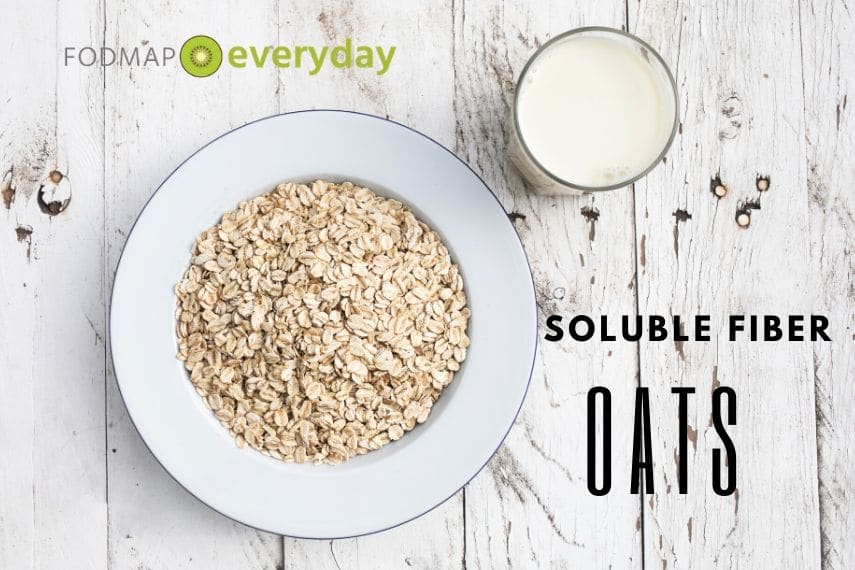
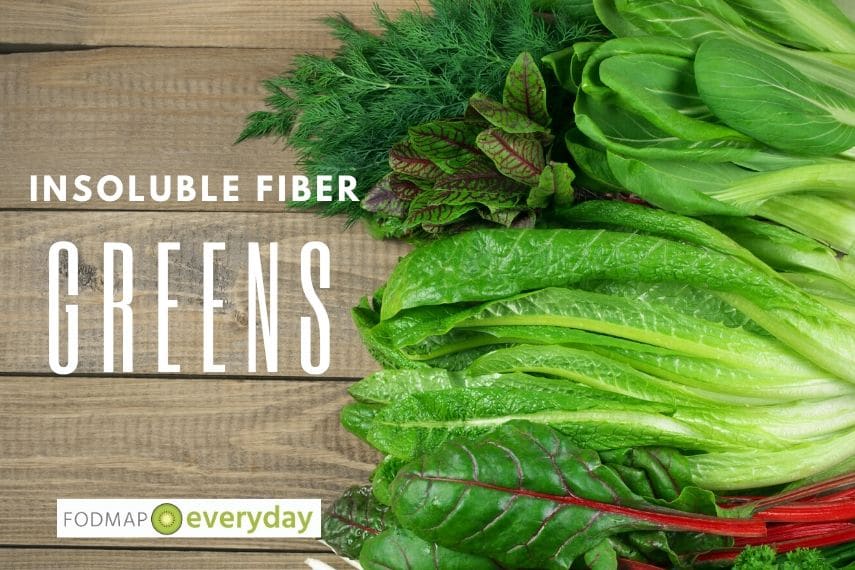
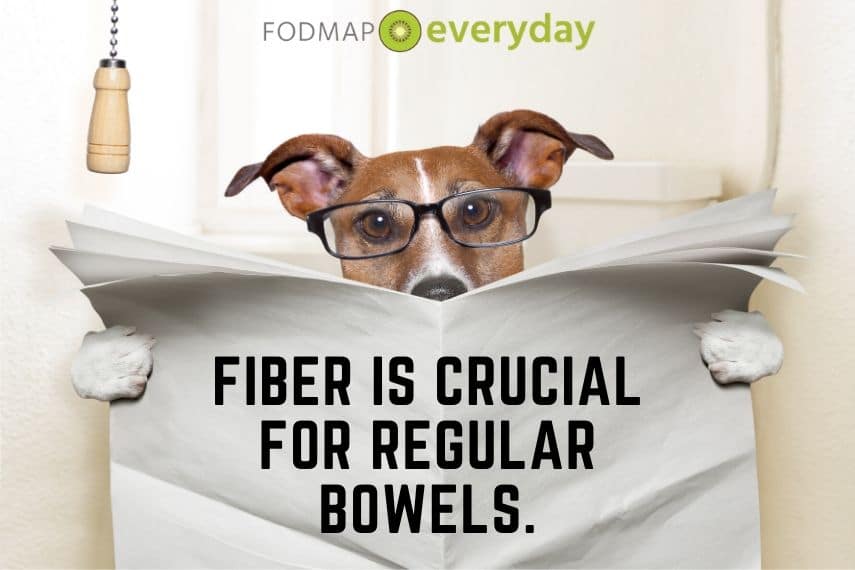


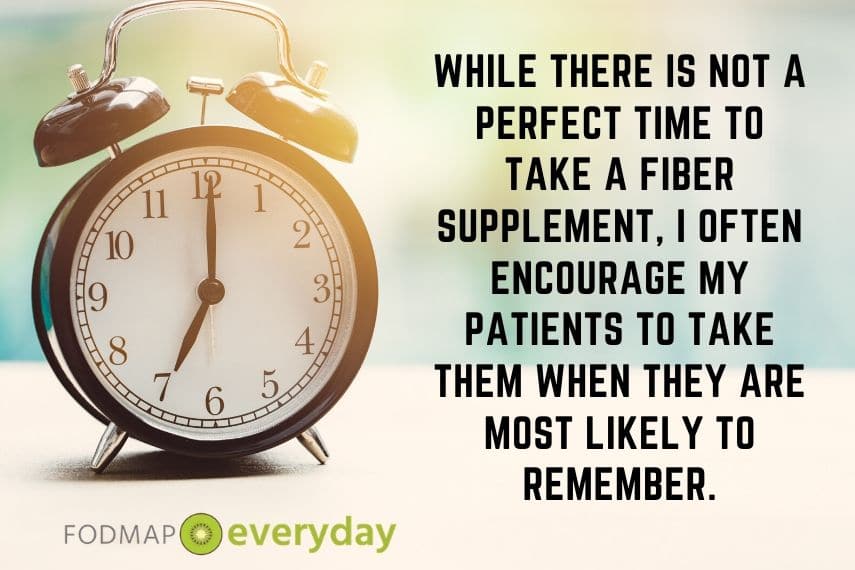
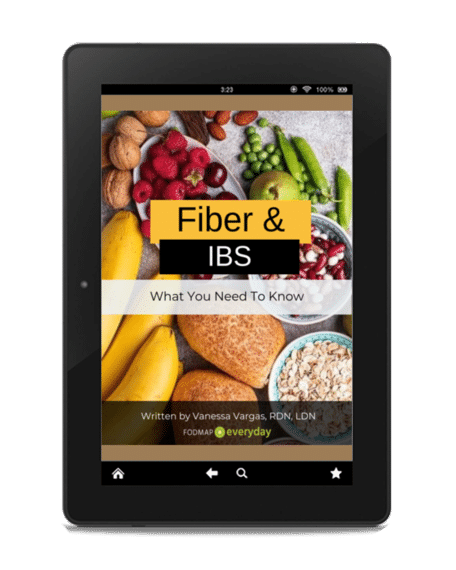
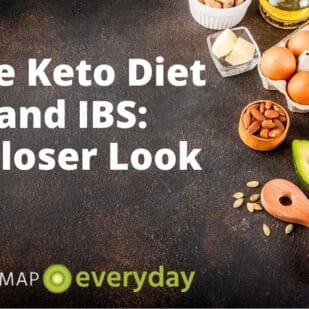





This is a really helpful article. Having suffered with IBS for over 10 years I’ve reluctantly given up lactose, onions and recently realised just how badly garlic seems to affect me. It takes time to manage a long term health issue like this but your advice is fantastic. I will be trying the fibre supplements along with continued addition of fibre to my diet.
Jo I am so glad this was helpful…and BTW huge jack russell fan!
Thank you for this helpful article. I recently found out that calcium carbophil requires an acidic fluid in order to swell with water, so if a person has low stomach acid Fibercon may not work for them.
Hi there Bonnie. Very curious as to where you hear that? Perhaps you could share?
Our RD Vanessa says, “I have not seen any clinical evidence or recommendations that specific fiber supplements including Fibercon are contraindicated with hypochlorhydria (a deficiency of hydrochloric acid in the stomach). Even in this condition the stomach ph is 3-5 which would still be an acidic environment.
Fiber supplement tolerance can vary by individual. I would recommend talking with your GI Dr or GI RD to discuss your individual needs based on your medical history. As with all fiber supplements it is often recommended to start slow and increase to full dose as tolerated.”
Hi Dede,
I saw that information in the posting for calcium polycarbophil on Wikipedia. An acidic fluid is required to remove the calcium before the polycarbophil can begin to retain water. I became curious about the mechanism of action after taking FiberCon for 6 days and having no result at all. And noted that a small percentage of people who had posted reviews on Amazon also had no result. I did an experiment myself, and dissolved a FiberCon in half a cup of water, and all it did was dissolve into visible particles; it did not gel at all. Then I dissolved a Fibercon in half a cup of water containing 4 dissolved Betain HCl tablets; there was quite a difference in appearance between the two; in the HCl solution, the Fibercon had begun to take on water. But I am hesitant to take an HCl supplement, so I decided to switch to psyllium powder instead. Bonnie
Hi Bonnie, this is from Vanessa Vargas RD, who wrote the article: ”
Tolerance and improvements with the addition of fiber supplements is very individualized and subjective. Base line symptoms may also wax and wane for various reasons such as diet, stress, and hormones sometimes making it challenging to assess effectiveness of a new fiber supplements. There may be medical reasons why one fiber supplements is recommended therefore we highly recommend talking with your healthcare professional. Both Fibercon and psyllium are appropriate for IBS, yet some feel that they have been response with one versus the other. Feel free to discuss this with your GI if you have concerns of using FiberCon. I have not seem any clinical evidence that having higher or lower stomach acid has been shown to play a role in fiber tolerance. This sounds like an interesting experience, however it would be worth noting that this experiment took place outside the stomach in a more controlled environment and likely resulted in a very acidic environment (much more acidic than the stomach + supplemental HCl). It would not be fair to say that this experiment would yield the same results if done within the stomach. Here is one study that demonstrated the additional of betaine HCl did temporally lower gastric pH with drug induced hypochlorhydria, however there is no mention of fiber supplements in this article. https://www.ncbi.nlm.nih.gov/pmc/articles/PMC3946491/
Vanessa Vargas RD”
Hi,
Have you reviewed or are you aware of any reviews of a product called Colon Broom and how is can be used a supplement for IBS C? It is psyllium husk based with limited other ingredients but every after reading this article, I still am not sure if it would be effective. I had been taking Trulance but my insurance recently stopped covering it and I need a little more help beyond diet.
I would first look to suggestions made by our RDs. Have you seen our article on IBS-C?
Thank you for a very informative article! I have a question about the time to take a fiber supplement, whether psyllium powder or any other: do I need to space it out from any vitamins and medications I take? I read that we need to wait two hours before or after, and then it never works out, so I’m not consistent taking Konsyl. Is it okay to take Konsyl first thing in the morning on an empty stomach, then waiting 20-30 minutes before eating breakfast with my medications?
From Vanessa: The recommendation is to take psyllium supplements at least 1-2 hours before or after taking other medications to avoid any potential interference with the absorption of medications and nutrients. You can always ask your pharmacists to see if there is this potential, if not you can decrease the time.
You can also take the fiber supplement in the evening, I often recommend this and see great results.
After mentioning IBS-M once, it’s never mentioned again and NOT ONE fiber recommendation is made for it. I’m very disappointed. Once again,my type of IBS is almost completely ignored.
Hi Marian, being able to recommend a type of fiber is very individual and would best be addressed with your dietitian. We offer facts but cannot give individual medial advice, nor would it be prudent for us to do so. Have you discussed this specifically with your medical team?